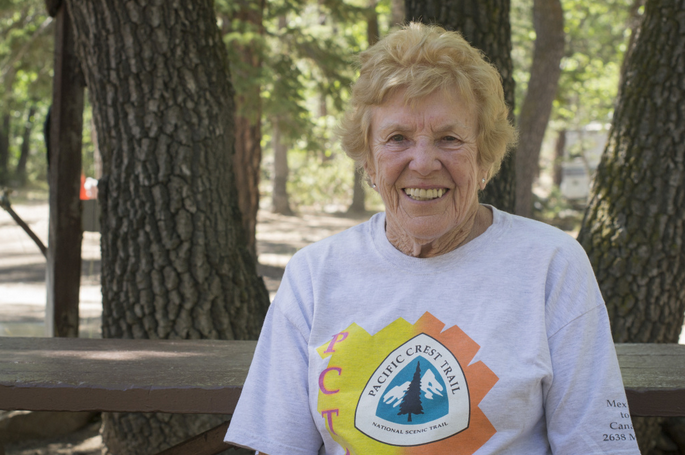Every summer, hundreds of hikers make their way from the Mexican border to the Canadian border on the Pacific Crest Trail. This year the Pacific Crest Trail Association estimates there are well over 1,000 hikers attempting the walk through California, Oregon and Washington, making it one of the busiest years the trail has ever seen.
Much of that traffic is inspired by Cheryl Strayed’s 2012 memoir “Wild,” and the recent Reese Witherspoon film of the same name. But long before there was Cheryl Strayed, there was another woman making a splash on the PCT: Teddi Boston.
Teddi Boston hiked from Canada to Mexico on the PCT in 1976 at age of 49. She was one of the first women to ever hike the trail alone.
Jack Haskel of the Pacific Crest Trail Association says Boston has a lasting legacy in the hiking community.
“People recognize her as one of the early solo female hikers, and today there’s a lot of solo women out on the PCT, and Teddi is one of them that pioneered that,” he said.
Boston credits her childhood in rural Maine with giving her a love of the outdoors. By the mid 1970s, she had four children and was living in Anaheim. She always loved to take her kids camping in Yosemite, and it was during one of those trips that she first got the idea to try a longer outdoor adventure.
“I started meeting people talking about the Pacific Crest Trail,” Boston said. “So when I got home I had to start doing research… And it took me two years before I accomplished it.”
There were obstacles to the challenge. The trail wasn’t officially completed until 1993. Boston didn’t let that stop her. She set out on May 1, 1976, with just a pair of boots and a 65-pound backpack.
“Today, hikers have things like smartphone apps and resupply plans, Teddi would have had to do a whole lot more research,” Haskel said.
But Boston says her plan was pretty simple.
“I was on map and compass. Point the compass south and say, ‘That’s where I want to go.’ Follow the jackrabbit, he’s headed south,” Boston said, with a laugh.
There weren’t many hikers attempting the PCT when Boston did. And among those few, she was unique.
“Most hikers in the 1970s, sort of like most hikers today, are young white guys, pretty physically fit, right out of college, with a lot of time and money and passion on their hands. And Teddi was a mother in her 40s and that was unusual,” Haskel said.
Boston says when she started planning her trek, not everyone took her seriously. One male friend who told her, “‘Teddi, you just can’t do this. A woman alone cannot do this trail.’” Boston said she looked at him and said, “‘Bet-me-binky, you are going to owe me the most expensive steak in Orange County when I get back.’”
Boston did finish her historic hike on October 16, 1976. Family, friends and supporters were there to celebrate with her at the end of the trail. Her accomplishment even made news headlines.
“One of them said, ‘Mother of Four Braves the Wild!’” Boston recalled.
Boston makes her five-and-a-half month journey sound easy. But she faced plenty of challenges along the way. She injured her eye in Oregon, she hiked through heavy snow in the Sierra Nevada, she nearly ran out of water in Northern California. And then, she found herself with too much water in Southern California, when Tropical Storm Kathleen flooded the Mojave and washed away large sections of the trail.
“The desert just filled up, it was like a big lake. Oh my God, was I wet,” Boston said. “I looked like a drowned rat. So I slogged across the desert to Mojave and ended up in front of a motel and I went in and said, ‘You better have a room, I don’t care if it’s a broom closet. I need a place to stay!’”
But even during close calls, Boston said she never thought about giving up.
“You had to get out of the situation. It’s going to be better down the road. You’re here. Buck up, and go ahead!” Boston said.
At 88, Boston is still active in the outdoors. She volunteers with several outdoor organizations and she still loves hiking. In fact, last year, she trekked more than 300 miles on the PCT, just to see if she could still do it. Turns out, she can. And, she says as long as her legs keep working, she’ll still be out on the trail.
Listen to this story on KPCC
